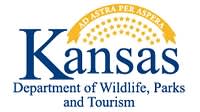Wildlife Checkpoint Planned in South-Central Kansas

Joint effort will check for drivers’ licenses and possession of wildlife
The Kansas Department of Wildlife, Parks, and Tourism (KDWPT) and local law enforcement officials will conduct a joint checkpoint in south central Kansas in early December. The regular firearm deer season starts December 4, and upland game bird, certain waterfowl and trapping seasons are underway. The checkpoint is intended to help enforce state and federal wildlife laws, gather critical harvest and biological information and enforce the state’s driver’s licensing laws.
Local law enforcement officers will operate the first stage of the checkpoint to be sure drivers are properly licensed to be driving. If a driver does not have a valid license, appropriate enforcement actions will be taken. Travelers can expect minimal delays from this portion of the checkpoint.
Occupants of vehicles in the first check lane will be asked if they are hunters or are transporting wildlife. If yes in either case, drivers will be directed to a nearby check lane where KDWPT natural resource officers will check for required licenses and permits, count the game and gather biological, harvest, and hunter success information. This portion of the checkpoint should also cause minimal delay.
Additional wildlife checkpoints may occur around the state during the fall and winter hunting seasons.

